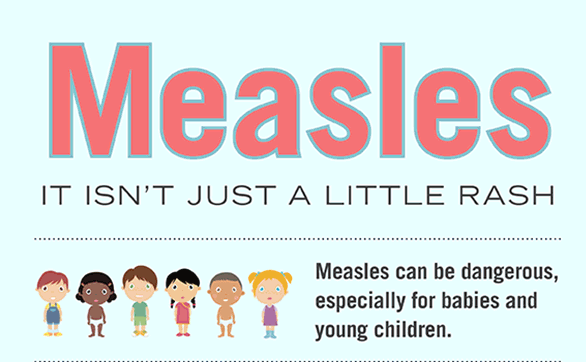

The Centers for Disease Control is reporting that there are now 626 cases of measles across 22 states. Just last week, state health departments confirmed a case in eastern Tennessee. There are also confirmed cases in Florida and Georgia, and Alabama health officials are concerned the disease could spread there.
From January 1 to April 19, 2019, 626** individual cases of measles have been confirmed in 22 states. This is an increase of 71 cases from the previous week. This is the second-greatest number of cases reported in the U.S. since measles was eliminated in 2000, second only to the 667 cases reported during all of 2014. In the coming weeks, 2019 confirmed case numbers will likely surpass 2014 levels.
The states that have reported cases to CDC are Arizona, California, Colorado, Connecticut, Florida, Georgia, Illinois, Indiana, Iowa, Kentucky, Maryland, Massachusetts, Michigan, Missouri, Nevada, New Hampshire, New Jersey, New York, Oregon, Texas, Tennessee, and Washington.
In a given year, more measles cases can occur for any of the following reasons:
- an increase in the number of travelers who get measles abroad and bring it into the U.S., and/or
- further spread of measles in U.S. communities with pockets of unvaccinated people.
The majority of people who get measles are unvaccinated. Measles is still common in many parts of the world including some countries in Europe, Asia, the Pacific, and Africa.
About the Measles
Measles is a very contagious disease caused by a virus. It spreads through the air when an infected person coughs or sneezes. Measles starts with fever. Soon after, it causes a cough, runny nose, and red eyes. Then a rash of tiny, red spots breaks out. It starts at the head and spreads to the rest of the body.
Measles can be prevented with MMR vaccine. The vaccine protects against three diseases: measles, mumps, and rubella. CDC recommends children get two doses of MMR vaccine, starting with the first dose at 12 through 15 months of age, and the second dose at 4 through 6 years of age. Teens and adults should also be up to date on their MMR vaccination.
Find out more about the measles vaccine at the Centers for Disease Control’s website.





Be the first to comment